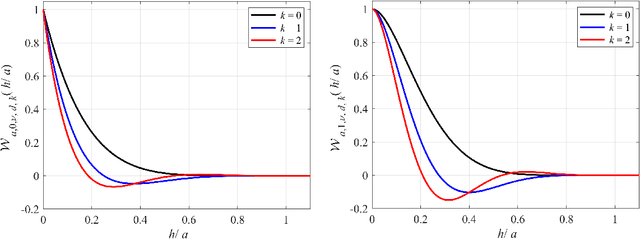Emilio Porcu
Unified Native Spaces in Kernel Methods
Jan 03, 2025



Abstract:There exists a plethora of parametric models for positive definite kernels, and their use is ubiquitous in disciplines as diverse as statistics, machine learning, numerical analysis, and approximation theory. Usually, the kernel parameters index certain features of an associated process. Amongst those features, smoothness (in the sense of Sobolev spaces, mean square differentiability, and fractal dimensions), compact or global supports, and negative dependencies (hole effects) are of interest to several theoretical and applied disciplines. This paper unifies a wealth of well-known kernels into a single parametric class that encompasses them as special cases, attained either by exact parameterization or through parametric asymptotics. We furthermore characterize the Sobolev space that is norm equivalent to the RKHS associated with the new kernel. As a by-product, we infer the Sobolev spaces that are associated with existing classes of kernels. We illustrate the main properties of the new class, show how this class can switch from compact to global supports, and provide special cases for which the kernel attains negative values over nontrivial intervals. Hence, the proposed class of kernel is the reproducing kernel of a very rich Hilbert space that contains many special cases, including the celebrated Mat\'ern and Wendland kernels, as well as their aliases with hole effects.
Sobolev Spaces, Kernels and Discrepancies over Hyperspheres
Nov 16, 2022Abstract:This work provides theoretical foundations for kernel methods in the hyperspherical context. Specifically, we characterise the native spaces (reproducing kernel Hilbert spaces) and the Sobolev spaces associated with kernels defined over hyperspheres. Our results have direct consequences for kernel cubature, determining the rate of convergence of the worst case error, and expanding the applicability of cubature algorithms based on Stein's method. We first introduce a suitable characterisation on Sobolev spaces on the $d$-dimensional hypersphere embedded in $(d+1)$-dimensional Euclidean spaces. Our characterisation is based on the Fourier--Schoenberg sequences associated with a given kernel. Such sequences are hard (if not impossible) to compute analytically on $d$-dimensional spheres, but often feasible over Hilbert spheres. We circumvent this problem by finding a projection operator that allows to Fourier mapping from Hilbert into finite dimensional hyperspheres. We illustrate our findings through some parametric families of kernels.
 Add to Chrome
Add to Chrome Add to Firefox
Add to Firefox Add to Edge
Add to Edge